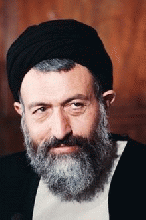
Ayatollah Mohammad Hussein Beshseti. Reputedly the second most powerful figure in the Iranian Revolution after Ayatollah Khomeini.
(Image by Photo courtesy of Irin news agency.) Details DMCA
Above photo: Ayatollah Mohammad Hussein Beshseti. Reputedly the second most powerful figure in the Iranian Revolution after Ayatollah Khomeini. Photo courtesy of Irin news agency.
According to claimed eyewitnesses, it is true that there was a short animated-perhaps even hostile-discussion between Imam Sadr and Libyan leader Gadaffi during their initial meeting. But heated exchanges were common with the volatile Gadaffi who usually soon calmed down according to his cousin Ahmed Gaddaf al-Dam and former Libyan intelligence chief Abdullah Senussi as well as Muammar Gadaffi's son Seif el Islam.But the Imam's fate had already been sealed before his delegation returned to their hotel accommodations to wait for Ayatollah Behsheti.
Muammar Gadaffi's former personal aide, Colonial Ahmad Ramadan al-Asaibie, gave an interview to journalist Jenan Moussa which was released by the UAE-based television channel Al-Aan on 8 November 2011. Ramadan claims to have witnessed the arrival at Muammar Gaddafi's Headquarters of the Sadr delegation. Following the encounter, Colonel Gaddafi reportedly ordered to have them taken to their hotel. They were escorted by Foreign Minister Taha El Sheriff Ben Amer ( who would soon be killed in a then mysterious, but now explained helicopter crash), intelligence chief General Abu Ghalia Fraj, and General Bashir Humeida, head of Gadaffi's "Presidential Administration."
After waiting at his hotel for three days for the promised Mohammad Behsesti meeting, Musa Sadr, known to be impatient, became suspicious after reportedly speaking with colleagues in Lebanon and decided to depart immediately for Beirut. His phone call had been monitored by Libyan Intelligence and when the Sadr delegation, arrived at Tripoli airport, they were confronted in the VIP lounge and asked to return to his hotel. But Imam Sadr refused.
An international telephone conversation had taken place that morning from Gadaffi's office now widely thought to have been with Ayatollah Behesti in Tehran, over what to do with Imam Sadr and the Lebanese delegation. Gadaffi was instructed during the conversation by Behesti, according to a claimed CIA phone monitoring report, to prevent the Sadr delegation from leaving Libya "by all means necessary." This precise language, but not the CIA monitoring of the conversation, has also been claimed by Kai Bird in his book , "The Good Spy." Gadaffi was also advised during the phone call that Sadr was a "western agent" and a "threat to Ayatollah Khomeini." Those words were presumably chosen by an increasingly paranoid Behesti to justify Imam Sadr's death sentence.
Refusing to return to their hotel and insisting on taking a flight to Beirut, Imam Sadr and his companions were then assaulted and taken by force to Janzour by two militiamen from the Abu Nidal Organization. At the time Abu Nidal was said to be somewhat on the outs with Gadaffi but still did some work for him. Four years later Abu Nidal's relations with Gadaffi had improved and he was provided an office two blocks west of Green Square in Tripoli which this observer visited in 1985. In the back of his building was a small field. After the summer of 2011 various body parts were found buried in the yard where visitors were often offered tea. But none of the remains were ever proven to belong to the Musa Sadr delegation despite occasional media speculation and gossip in Libya to the contrary.
Italy's Corriere della Sera newspaper based on information from Gadaffi security officials who defected during the 2011 revolution, correctly reported that Abu Nidal shot and killed Musa Sadr and his companions on September 5 1978. This observer later was advised by a longtime Libyan government official that before being shot they had been imprisoned for three days.
Next Page 1 | 2 | 3 | 4 | 5 | 6
(Note: You can view every article as one long page if you sign up as an Advocate Member, or higher).





